Elinore Macdonald–Life for a Little Girl in the Post-War Days
Elinore Macdonald (b. 1944) remembers the first years of her life between being scared of bombers, missing her father, and reading the “funnies”.
TEXT VERSION:
Bruce Macdonald: I know you’ve lived a long time in Vancouver; you’ve lived all over the city for many years on Fraser Street, worked downtown, lived on 20th through the ’40s and ’50s, and you were mentioning that you do think about those days. So I was wondering if you could go into a bit of detail about what life was like in Vancouver in the ’40s and ’50s.
Elinore Macdonald: Well, I could start out with the families. In the typical family, the father went to work and came home in the evenings, unless, of course, he had shift work. The mother stayed home, and it was a full-time job, because everybody on the block who had kids had between 2 and 4 kids. And what was really interesting and very different from today is that we ran around totally unsupervised!
My earliest memory is me sitting on the curb; when my sister went off to kindergarten, I was nearly 3 years old, and I sat on the curb for 5-10 minutes after my sister left, and I heard a plane, so I’d look up—it was flying over—and I held my breath and wait, because what I’d been told planes did was drop bombs. I’d never heard of anybody who went on a plane as a passenger anywhere. In my little 3 year-old mind, planes were not for freight or passengers; planes were for dropping bombs.
Another interesting thing from the War I never realized is that we would see searchlights (and I didn’t realize these were from the War), and if someone had something like a car lot special sale, they used the searchlights to draw you to their sale, so again, we had these remnants of the War.
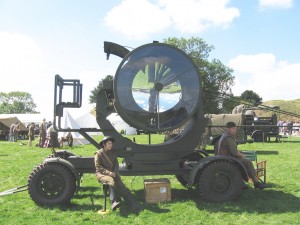
Image credit: fribbleblib, CC, Flickr
Because, during the War, there were so many people walking around in uniforms, and my dad went overseas once when I was 6, I would run to anybody in uniform and go ‘Daddy, Daddy!’, if he resembled my dad in the picture that we looked at every day and pine for. I had no idea who my dad really was until he came back after the War.
There were no seat belts, and I can remember our first car was a little Austin. The neighbourhood kids were just playing outside—we didn’t play that much on the streets; we never played street hockey or anything, but we did play in each other’s yards or in unfinished basements if the weather was bad—so, when my mom had an errand to run, all the neighbourhood kids would just pile in the car. There was no automatic turn signal, so you had to stick your arm out; our Austin had this little amber-coloured wing that you could put up.
One funny memory I have: there were 14 people in the car (because you’d just pile people in your lap and be squished in, you wouldn’t turn anybody away), and here we are going up this hill, this very steep hill, and the car goes slower and slower until it stops, and my mom goes: ‘Oh-oh, don’t tell Dad!’—we heard a lot of ‘don’t tell Dad!’ We were almost to the top and had to back all the way down.
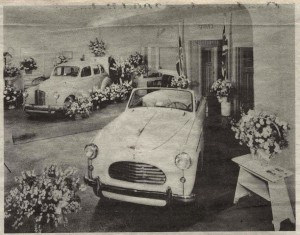
Image credit: James Tworow, CC, Flickr
But my mom was so generous, she was a wonderful person, and I think such were the times too: it was no big deal if somebody was there and they’d stay for dinner, people were really friendly, and we just went in and out of each other’s homes. Never heard of a thing called ‘play date’, and I don’t think our parents really knew where we were sometimes.
My dad would always tell us the history of Vancouver as we drove around, so we were very familiar with Vancouver. My earliest memory of being in Vancouver is the 4 days and 3 nights spent traveling on the train, traveling across from Ontario to here. My memory, because I was two-and-a-half, is a click-click-click, woo-woo-woo, ding-ding-ding, and I get chills to this day every time I hear a train whistling. People traveled by train a lot. Then we went back to Ontario, again- 4 days and 3 nights- when my sister and I were 13 and 14.
We didn’t do a lot of traveling; we traveled by the bus, Greyhound bus, or train. My sister and I took the train down to Seattle on our own one time in the ’50s and did a little shopping down there.
B.M.: How old were you that time?
Elinore Macdonald: Oh, about 13, in the ’50s.
B.M.: 1957?
Elinore Macdonald: That’s when I went to Ontario. I guess it was after the Depression, and not knowing what on Earth you’d do for work. All the people out of work riding the railways… really sad times.
And then the War where people lost so many loved ones, and the waiting, it was the waiting… People talk about the soldiers, but it was also hard on the women back home, so hard! You can imagine very young brides, because these were young girls, and the guys married them so they had a loved one write them letters every day, every day, letters…
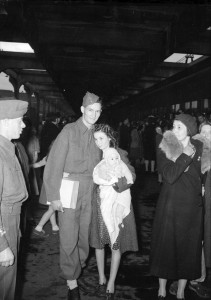
Image credit: Jack Lindsay, public domain
We’ve still got my grandfather’s letters from World War I; this is how we communicated then, through letters. What I was saying is: with all that hanging over, what we felt was happy and grateful. We were happy to feel safe, we were happy that the mailman was the mailman and he came every day and I think on Saturdays, too, and, if you mailed a letter, it was next-day delivery. You walked at most two blocks to a mailbox.
I can remember special delivery being 35 cents and less than 24 hour, in one case, to the Okanagan. You went to the post office; it was a brick building on the corner. A letter was 5 cents to mail in the ’50s—2 cent for a postcard— and we mailed tons of letters. We wrote thank-you notes, we sent invitations by mail, and it was a huge part of our life, to go get the mail each day. Our doors had mail slots.
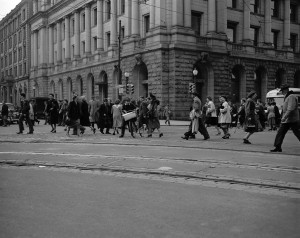
Image credit: Jack Lindsay, public domain
We also got newspaper delivery— people either got The Sun or The Province. Our family got The Province. One thing that kept us entertained, because, remember, there was no TV, was the comic strips. A few years ago I saw somewhere say ‘this is the last newspaper comic strip’. But back then we had to wait a whole day to see what happened next out of four pictures and a few words, like Superman and… oh, my God, they were like serials. Then, on the week-ends, we got the coloured funnies which they had again, for years afterwards, they still had colored funnies, and that was a big deal.
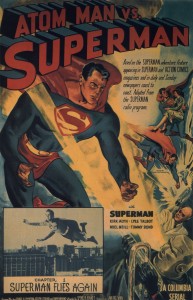
Image credit: Michael Newhouse, CC, Flickr
I remember Woodward’s; I worked on the food floor. What we knew is that Woodward’s catered all kinds of ethnic foods, and they had this whole variety of cheeses from around the world. As a person of British background I had orange cheddar cheese for anything, but I’m sure some of our neighbours enjoyed other cheeses. What I didn’t really understand was why some of them kind of smelled. Oh, and I do remember (because I was just talking about this with my grandson— how to accept foods politely) that I was probably six-years-old and I picked this cheese that wasn’t orange, and I was a little bit skeptical, yet I took a mouthful, and it was horrible! But, unlike later on when people would just go ‘yuck’ and make a big thing about it, I just held it in my mouth and then snuck into the bathroom and spit it out.
But Woodward’s had—I worked in the produce department—so many fruits and vegetables! I bagged strawberries all day long. And they had an irregular clothing department where we got our clothes from, because we were very frugal, so the clothes were dirt cheap. We had to really look closely to see what the irregular thing was, in case it was something embarrassing, but it sure saved us a lot of money, and you could get some really good clothes there.
They had, at Christmas time, a window display. On Sundays, they would draw the curtains. The really different thing was: it wasn’t until quite later on that they had the store open on Sundays. I remember that my sister had a vote and she voted against it, and I had a heated argument with her saying that ‘you’re gonna hear from me if I ever catch you shopping on Sunday!’ because it’s convenient. But back then, on the Sabbath, on the 7th day, we rested, and that really applied to a lot of areas.
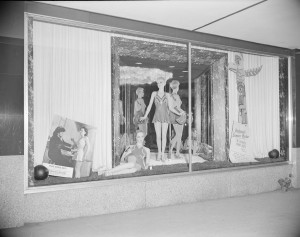
Image credit: Jack Lindsay, public domain
The Church was part of it; we all went to church. We never used the word ‘teenagers’ in the ’40s and ’50s; we never heard the word ‘teenaged.’ My dad made a point of that: ‘I was never called a teenager; I don’t know what all this fuss is about!’ I guess he just carried on with life and being a teenager just didn’t come up. They had youth groups; this would be the word: ‘youth’.
Such an opulent thing were the Orpheum theatres, compared to our local movie theatres. What we learned was that people smoked and drank a lot, that guys wooed girls, and in the end, they kiss and it’s very romantic and they live happily ever after. Those were the kind of movies I saw as a child.
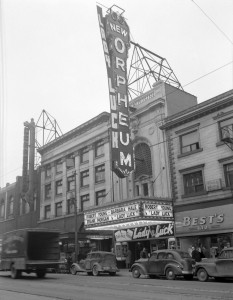
Image credit: Jack Lindsay, public domain
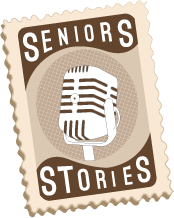



Leave a Reply